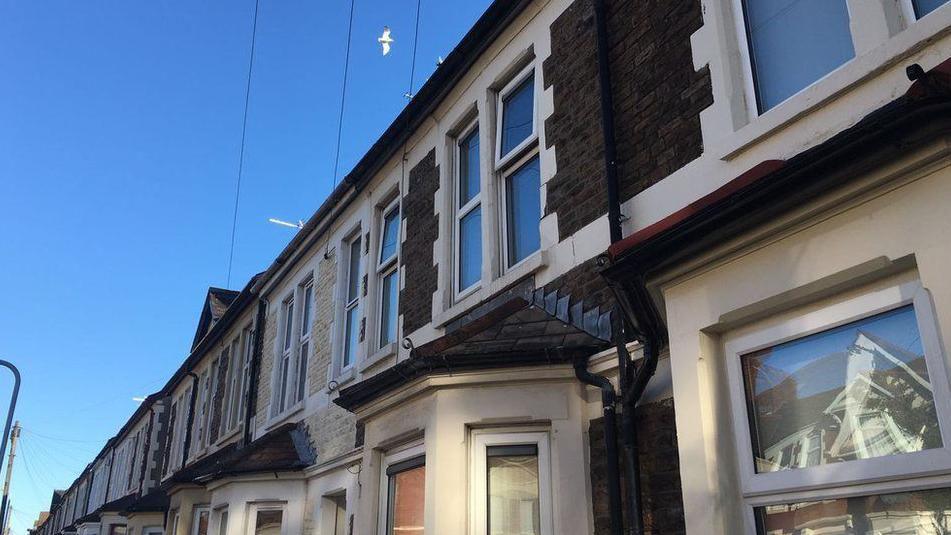Major Welsh council tax reform delayed until 2028

The reforms were due to come into effect as early as 2025
- Published
A big shake up in council tax has been postponed until 2028, after the next Senedd election.
The Welsh government has been considering reforms that could change the council tax bills for hundreds of thousands of households - and had intended to introduce them as early as next year.
Homes were being revalued for the first time in 20 years and new property bands could be created.
The decision comes after a consultation launched last November asked whether the changes should be phased in more slowly.
Voters will go to the polls in the next Senedd election is due in May 2026.
The government said it was still committed to “making council tax fairer and more up-to-date”, but economists who advised them said the delay was “disappointing”.
Council tax could rise for 470,000 homes in Wales
- Published14 November 2023
Welsh council tax revaluation goes ahead
- Published2 May 2023
MS banned from Senedd over behaviour can return
- Published15 May 2024
Citizens Advice Cymru said they saw "no clear benefit" to the delay, while Plaid Cymru said it was "disappointed" the Welsh government was not being more "ambitious" in its timetable.
Meanwhile a Welsh Conservative suggested the decision, coupled with Tuesday's announcement that changes to farm payments will be delayed, could be driven by the prospect of looming elections.
Established in the early 1990s, council tax has long been criticised for being unfair because it is based on property prices - not on people's ability to pay.
The Labour Welsh government and Plaid Cymru - who have a co-operation deal in the Welsh Parliament - have been looking at ways to try to address that.
Ministers asked for a revaluation of properties, which have increased in value significantly since the last exercise in 2003.
In the Senedd on Wednesday Labour's Finance Minister Rebecca Evans said revaluation would come into effect in 2028.
There were also proposals to create new tax bands that would have increased bills for the most expensive properties and cut them for people in lower value homes - but Ms Evans said that would involve another consultation "closer to 2028".
She said the cost of living crisis was "very central to our considerations".
In a written statement, Ms Evans said she had “listened carefully” to a consultation which found support for introducing the changes more slowly.
She said: “I believe this approach demonstrates a continuing commitment to fair and progressive taxation, as well as this Welsh Government’s commitment to listening to the people of Wales.”
'Long overdue'
The government’s consultation relied on work by the Institute for Fiscal Studies (IFS) which analysed possible changes.
IFS senior economist Stuart Adam said: “The decision to postpone the planned revaluation and reform of council tax in Wales until 2028 – fully 23 years after the last revaluation – is disappointing.
“A revaluation is already long overdue, and there is no obvious economic or administrative need for, or benefit from, delay.
“But entrenching the date of the revaluation in primary legislation is welcome: we can only hope it makes it less likely to be further delayed or cancelled when the time comes.”
The news was received poorly by Citizens Advice Cymru, which said that council tax is in "desperate need of reform".
It said in recent months it had seen a "worrying rise in the number of people struggling with council tax arrears".
Assistant director, Luke Young, said the levy places an "unfair tax burden on low income households - and property values are already more than 20 years out of date.
"We do not see a clear benefit for the people we support in waiting until 2028 to begin the revaluation."
Elections
In the Welsh Parliament, Welsh Conservative Shadow Minister for Finance, Peter Fox, complained that the government had chosen to make the announcement via a written statement, rather than a statement to the Senedd.
"Some cynics might say with the announcement today and yesterday's announcement around single farm payments... there must be some elections on the way that might be driving the government's decisions here, but I'm not necessarily one of those."
Plaid Cymru's finance spokesman, Peredur Owen Griffiths, said: "Whilst we’ve succeeded in ensuring that Welsh government commits to reform, we are disappointed that it hasn’t adopted a more ambitious timetable.
"We had hoped that Welsh government would seize the opportunity to move quickly help some of the poorest householders, currently suffering the worst effects of the cost-of-living crisis, and who would have benefited from lower bills in 2025.”
Additional reporting by David Deans.